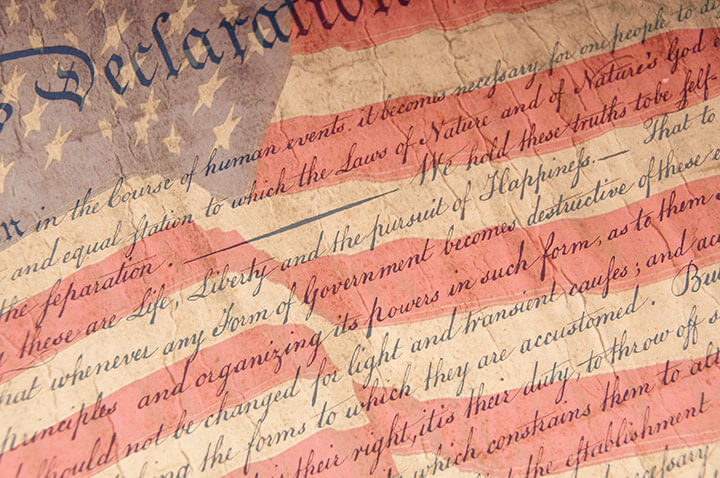Happy are the people whose God is the LORD.
Psalm 144:15
It is surely one of the more misunderstood phrases in American culture — “the pursuit of happiness”. The phrase is enshrined in the second sentence of our fledgling nation’s Declaration of Independence, where among “certain inalienable rights” are “Life, Liberty, and the pursuit of Happiness.”
Many years ago I was visiting a young friend in a rehab hospital facing up to his drug addiction. While at the hospital I talked with a psychiatrist about my friend’s addiction. The psychiatrist told me that after emigrating from Germany to America he learned about the phrase “the pursuit of happiness.” The psychiatrist said that as a newcomer to America he knew he would never lack for patients with problems to treat. He explained that people living in pursuit of happiness would be very unhappy people. The years have told me the psychiatrist was right.
But the author of that phrase in the Declaration of Independence, Thomas Jefferson, meant something very different than many people take it to mean today. Jefferson followed in a long line of ethical thinkers who understood the pursuit of happiness to be the pursuit of virtue. For Jefferson and his compatriots, happiness was understood as being good rather than feeling good. In a letter to a former secretary, William Short, Jefferson said he considered “Virtue the foundation of happiness.” (Papers of Thomas Jefferson) Jefferson, like our nation’s other Founders, was convinced that the pursuit of virtue was indispensable to a nation’s happiness.
Historians tell us Jefferson borrowed “the pursuit of happiness” from the English philosopher John Locke. Writing in An Essay Concerning Human Understanding, Locke distinguished between “real” and “imaginary” happiness, between “true pleasures” and “false pleasures.” Locke warned that happiness would not come from property, pleasure, or the satisfaction of desire, but happiness would come only from the pursuit of virtue. By Locke’s analysis, a bank robber celebrating his success with a friend at the pub is happy, but not really. The robber is experiencing but an “imaginary” happiness without any “true pleasure.”
John Locke had drawn upon Greek and Roman philosophers who equated a genuinely happy life with the virtuous life. Locke especially looked to Aristotle who devoted more pages to the subject of happiness than any writer before modern times. Aristotle maintained that virtue is the only foundation for a happy life. He said that happiness is the “activity of the soul expressing itself.” (Nicomachean Ethics)
Locke also acknowledged his debt to the Roman philosopher Cicero who said, in his treatise On Moral Ends, that we should eliminate pleasure from any discussion of happiness. Happiness, Cicero thought, has to do with the practice of virtue. “Indeed,” Cicero said, “no good should be declared supreme if it is lacking virtue, since nothing can be superior to that.” Cicero even suggested that a virtuous person might be happy while being tortured.
Look at today’s advertising, media, entertainment and education! We are a people madly in pursuit of happiness, but happiness without pursuit of virtue! “Do whatever makes you happy”, is the culture’s cliché. “If it feels good, do it!”
The psychiatrist in the rehab hospital was right! He would never lack for patients in a culture in pursuit of pleasure without virtue. Today we face critical choices as a nation. Let’s forget about what makes us feel good or momentarily happy! Let’s ask what is the right thing, the virtuous thing! Yet again the Scriptures show us the way: “Happy are the people whose God is the LORD”. Here is happiness “true” and “solid”.
Grace and peace,
Tim



